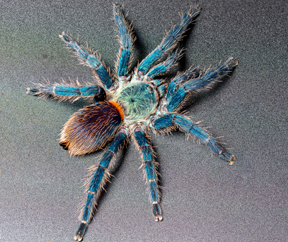Exotic pets ensnared in federal legislation to boost U.S. economy
D. diamantinensis

Photo by Dr. Andy Anderson
The Dolichothele
diamantinensis, also known as the Brazilian Blue Dwarf Beauty, is a tarantula owned by Dr. Andy Anderson of New Jersey. The veterinarian fears pending federal legislation meant to control invasive species would inadvertently and unnecessarily constrain the ownership of exotic pets.
Federal legislation designed to boost the U.S. economy by pumping hundreds of billions of dollars into the domestic development of technologies to counter China's dominance in areas such as semiconductor manufacturing has touched off concerns in the veterinary community.
The reason? Buried in the 3,610-page America Competes Act of 2022, passed last month by the House of Representatives, are new restrictions on the importation of non-native but common animal species and a ban their transport across state lines.
The restrictions, contained in amendments to a federal conservation law known as the Lacey Act, are intended to control damage caused by invasive species. But veterinarians and pet owners say the legislation as written would make it more difficult to access veterinary care for exotic pets and possibly inadvertently worsen problems of non-native species in the environment.
Dr. José Arce, president of American Veterinary Medical Association, said in a written statement provided to the VIN News Service: "Although well-intentioned, the AVMA opposes the Lacey Act language that was quietly included in the America Competes Act [that was] recently passed by the U.S. House of Representatives. … We have serious concerns about the legislation as it may impact access to care for wildlife and exotic animals, as well as create regulatory barriers to care through additional permitting of research institutions."
The legislation is in the process of being reconciled by a conference committee with the 1,200-page U.S. Innovation and Competition Act, passed by the Senate in June. There are hundreds of differences between the two compendiums of trade and industrial policy; among them are changes to the Lacey Act, which are not in the Senate bill.
Unpacking the Lacey Act
Enacted in 1900 and since amended, the federal conservation law prohibits trade in wildlife, fish and plants via state-by-state blacklists that are enforced by the U.S. Department of Agriculture and the U.S. Department of Interior.
The blacklists deem more than 200 species of mammals, birds, fish, mollusks, crustaceans and reptiles as "injurious," meaning they could harm the health of humans, agriculture, horticulture or forestry and the welfare and survival of wildlife indigenous to the United States. Blacklisted species are prohibited in the U.S.
Any species not listed is allowed to be imported, sometimes with permit or health certificate requirements. The list is ever-changing. By way of example, an amendment to the Lacey Act in 2012 banned the importation and interstate transport of three species of python and the green anaconda due to their impact on the Florida Everglades.
The effects of invasive species illustrate the need for more restrictions, according to U.S. Sen. Marco Rubio of Florida, sponsor of a separate bill to tighten the Lacey Act that was introduced to the Senate in March. "Sadly we have seen first-hand how ecologically devastating invasive species can be," he stated in a press release. "Invasive species threaten to decimate Florida's native plants and animals, and we must do what we can to prevent the introduction of new, injurious species."
Dr. Andy Anderson

Photo by Dr. Andy Anderson
Dr. Andy Anderson, holding a veiled chameleon, is concerned that proposed language in the America Competes Act prohibiting exotic animals from being transported across state lines would make veterinary care for such animals difficult to obtain.
That requires limiting the importation of species before they're tested for invasiveness, and restricting their interstate commerce, he said. Both conditions are components of the America Competes Act's version of Lacey Act changes, which were added as a rider to the bill just before the House passed it on Feb. 4.
The lawmaker who inserted the conservation law amendment into the America Competes Act has not been publicly identified. There is no attribution on any of the bill's 3,000-plus pages. Rubio, a senator, was not involved in crafting the House legislation.
Impact of proposed changes
Language in the America Competes Act calls for replacing the Lacey Act's blacklist system with a yet-to-be-made whitelist of animal species that would be legal to import to the United States. Rather than excluding only those with a track record of being a problem, such a system would place the onus on importers to prove that their species aren't invasive or otherwise harmful.
In other words, all birds, reptiles, aquatics, invertebrates, arachnids and other types of exotic animals kept as pets could no longer be imported into the U.S. or be transported across state lines unless such species are cleared via an administrative rulemaking process that deems them to be of low risk to the environment.
"That means they can label any animal as injurious, and ban it within 24 hours, and there's no [appeals process]" is how Dr. Andy Anderson, a practitioner in New Jersey and owner of exotic animals, sees it.
If the Lacey Act changes make it through the conference committee and are enacted, Anderson fears repercussions to his practice, where some of his clients are owners of exotic pets in the neighboring states of New York and Pennsylvania. Because the proposed law restricts transport across state lines, he said, those clients would no longer be able to seek care at his practice.
"I think there should be a blanket veterinary exclusion," Anderson said. "I think anybody who owns, within reason, avian species, reptiles [and the like] ... should be allowed to take them to the vet."
He added that he suspects lawmakers don't "realize that people take these animals to the vet."
Anderson, who's kept boa snakes and tarantulas most of his life, envisions a variety of possible outcomes if the legislation passes as written. "If people can't get their animals to a veterinarian, I think they'll just start dumping them and making the problem worse," he speculated.
Another possibility is that people ignore the ban, which would effectively prohibit exotic-animal keepers like him from moving with their pets to another state. "Are they really going to stop people from moving state-to-state? Probably not," Anderson mused. "People aren't going to stop keeping stuff, even if they can't do it legally. A lot will just go underground, and we'll see more poaching and brown-boxing of animals," he said, referring to unlabeled direct shipments.
Should the Lacey Act stipulations survive conference committee negotiations, both the House and Senate will have to vote on the compromise deal in order for the initiative to pass. The process is expected to take weeks, setting up the final bill for passage this spring.